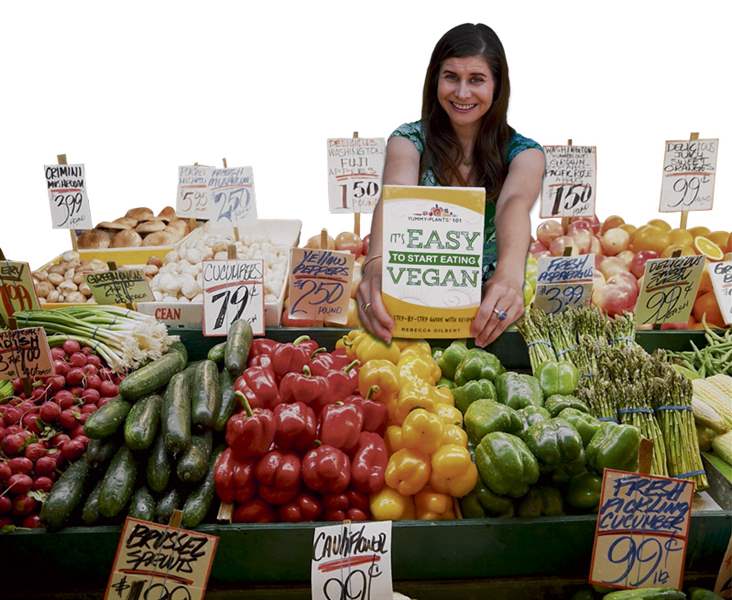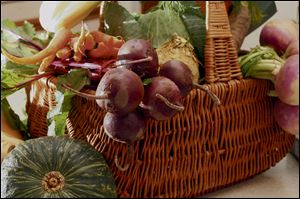
Reasons for green: Vegan communities growing with research on health benefits
7/14/2014
Rebecca Gilbert is the author of 'It's Easy to Start Eating Vegan.'
BLADE PHOTO ILLUSTRATION

Rebecca Gilbert is the author of 'It's Easy to Start Eating Vegan.'
No, vegans are not extraterrestrials from a planet orbiting Vega, although many might consider their dietary habits to be completely alien. Plant-only eaters represent a mere 2 percent of the population; another 5 percent describe themselves as vegetarian.
In contrast, Americans are noted for their penchant for overconsumption of such animal-based foods as meat, eggs and dairy along with high sugar intake. More than two-thirds of Americans are overweight or obese, more than a third having diabetes or metabolic syndrome. A poor diet is a risk factor for type 2 diabetes, which carries with it a number of serious and life-threatening complications. Family history, low activity and excess body weight also increase a person’s chance of getting the disease.
The “vegan” term can connote an animal-rights ethic and environmental activism, but the common denominator among all vegans is avoidance of all animal-based foodstuff.
What might sound crazy to some, a diet completely devoid of steaks, eggs, cheese and ice cream, has an ally: Science.
There are no guarantees, but evidence continues blooming that a daily diet based on whole plant foods can prevent or reverse many of the chronic health problems plaguing America — hypertension, high cholesterol, heart disease and type 2 diabetes. There’s further evidence that a plant-based diet also can help prevent or fight cancer, autoimmune diseases and arthritis, among many other common conditions.
Nutrition science prefers discussing a whole-plant-food diet, rather than a vegan one, to eliminate connotations of animal-rights or environmental ideology. But there’s little debate that diets limited to vegetables, fruits, nuts, beans, spices and herbs are healthful. They increase fiber intake that’s lacking in the large majority of American diets, while providing a wide range of antioxidants, minerals and other nutrients, which build the immune system, reduce inflammation and improve metabolism and gastrointestinal health. The diet also reduces or eliminates the intake of processed foods, empty calories and carcinogens.

There's little debate that diets limited to vegetables, fruits, nuts, beans, spices, and herbs are healthful.
Up to 50 vegans responded to a Post-Gazette Facebook request, many advocating animal rights. But many also said they experienced notable health benefits as a welcome side effect, including dramatic weight loss. The diet also helped individuals to reverse osteoarthritis, autoimmune disorders, colitis or Crohn’s disease, multiple sclerosis and cancer and bring sugar levels back to normal for those with type 2 diabetes. Others say their plant-based diets increase their energy levels, eliminate allergies and improve their skin, including eliminating acne.
“I will never not be a vegan,” said Ellie Gordon, 28, of Squirrel Hill, a vegetarian at age 11 and a vegan for seven years. “There have been so many scientific studies and research connecting longevity and alleviation of a whole plethora of health problems with a plant-based diet. There is a whole lot of research to support it even if people don’t care about it.”
Concerns about sufficient protein and amino acids are common complaints against the vegan diet. Several plant foods, including soy and hemp seeds, are complete proteins, containing all the essential amino acids. Eating a variety of protein-based vegetables — including leafy greens, nuts, seeds and beans — throughout the day can, in combination, provide the needed amino acids. In a study published in 1999 in the journal Medical Hypotheses, researcher Mark F. McCarty explained how vegetable protein reduces the risk of cancer, cardiovascular disease and obesity. His work in the field is often cited in discussions of the benefits of vegetable protein. McCarty is also co-founder of a mail-order nutritional supplements company, NutriGuard Research.
Scott Jurek, one of America's most notable ultramarathoners, became vegan in 1999 because of poor nutrition affecting him and others he knew. German strongman Patrik Baboumian, who holds world weight-lifting records, also is vegan. They say their success proves that the vegan diet is good for muscles and fitness.
Kathryn Spitz Cohan, who directs JFILM, the Pittsburgh Jewish Film Forum, had been vegetarian for three years when she was diagnosed with an aggressive form of breast cancer, which required her to undergo eight rounds of chemotherapy, rather than the traditional four, along with radiation therapy. She and her husband, Jeffrey Cohan, who directs Jewish Vegetarians of North America, became fully vegan during her treatment.

Ashley Fronert buys a veggie burger at the Bluebird Kitchen in Pittsburgh.
One benefit of her diet and exercise regimen that included power yoga was maintenance of energy levels during chemo. The couple climbed the steepest side of Acadia National Park's highest mountain in Maine during her treatments, she said. The diet and exercise regimen seemed to work. In follow-up tests, her radiologist told her there were no signs of cancer, not even a shadow of the former tumor. It was the most complete response to treatment her doctor had seen, Spitz Cohan said.
The vegan diet "was absolutely essential" to her good outcome with breast cancer, she said. "It's been four years," she said. "I can't say I'm out of the woods or that it will not come back. But I know I'm doing everything in my power to lead a healthy lifestyle, and it feels good. I don't feel I'm denying myself anything or restricting my life. I love the food. The food is delicious."
Many Americans believe the more protein the better. But a study published in March in Cell Metabolism found that "a low protein diet during middle age likely is beneficial to prevention of cancer, overall mortality and possibly even diabetes," and "a diet in which plant-based nutrients represent the majority of food intake is likely to maximize health benefits in all age groups."
The study authors had found an association between high-protein diets — "a significant portion" associated with animal-based protein — and deaths from cancer and other causes. So although the study also found that those 65 and older should get moderate- to high-protein intake, it says their focus should be "preferably mostly plant-based consumption to allow the maintenance of a healthy weight and protection from frailty."
The most noncontroversial statement in food science is that people should eat more fruits and vegetables.
"No diet won't agree with that," said Michael Greger, physician and director of public health and animal agriculture at the Humane Society of the United States. Also founder of NutritionFacts.org, he reviews 12,000 health studies a year to keep track of nutrition science. "It not only can prevent but it also can reverse heart disease, type 2 diabetes and hypertension. Overwhelmingly it is the diet most associated with chronic-disease prevention and reversal of most of the diseases plaguing the Western world."
On average, he said, vegans are 36 pounds lighter than omnivores and feature the lowest rates of cataracts, hypertension, diabetes and obesity. The Adventist Health Studies from 1958 to the present and involving 96,000 people (including 4,000 vegans and 20,000 vegetarians) are cited as providing the clearest evidence of health advantages from plant-based foods.
The study, Dr. Greger said, has shown that vegans have the best health outcomes, followed by vegetarians. Health benefits progressively recede with increased percentages of animal-based foods. Publicity about plant-based health advantages is working. Meat consumption has dropped 12 percent in the past five years.
But while all vegan diets eliminate meat and dairy, not all vegan diets are healthy. "Potato chips, Oreos and Twinkies are all vegan," Dr. Greger said as an explanation.